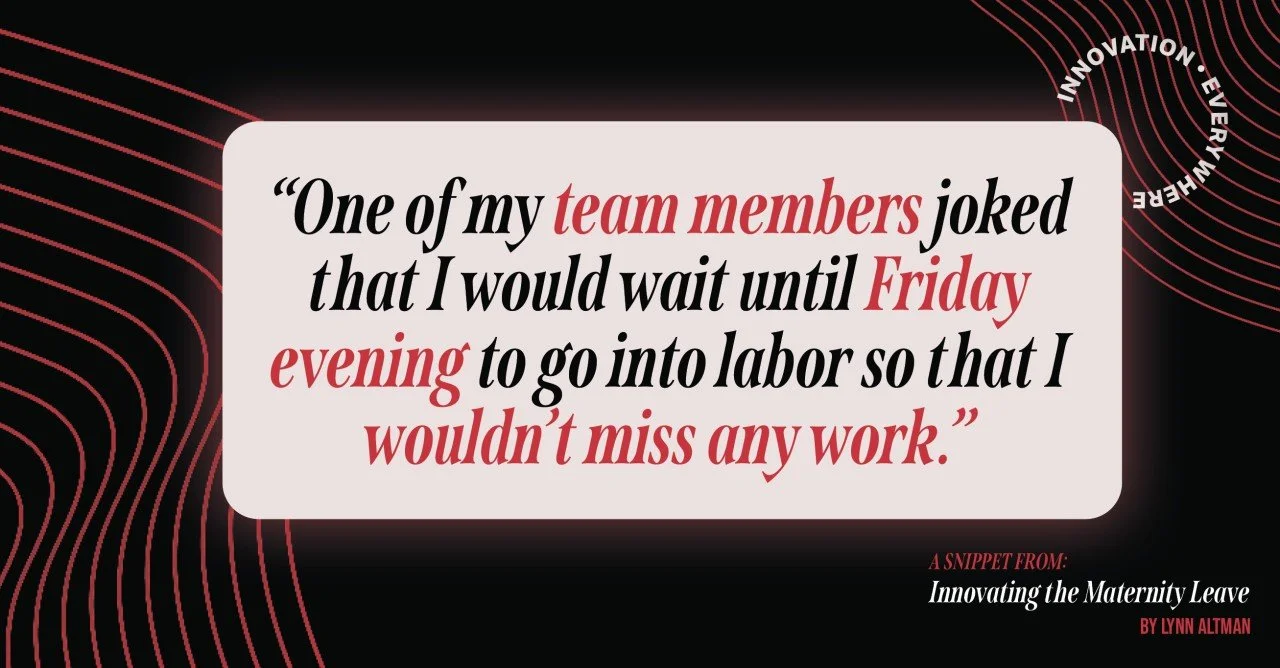Innovating the Maternity Leave
I’ve owned an innovation agency for over 15 years, and most of the people on my team are women. There was a point where two of us were pregnant, so we thought it would be fun to place bets on when each of us would actually deliver. One of my team members joked that I would wait until Friday evening to go into labor so that I wouldn’t miss any work.
It was one part sad, one part funny, and one hundred percent what happened: I went into labor on Friday night, delivered my son Saturday morning, and was back on the phone with clients the following week.
My son and me
According to a Pew Research study, the US is the only country out of 41 nations without a government-mandated paid parental leave of any kind. And yet, even were I eligible for a such a leave, I don’t know if I could have taken one. Not only did I feel responsible for ensuring that things continued to run smoothly with my business, my team, and my clients—I love the work I do and the thought of shutting off for 3 months seemed not only unrealistic, but unfathomable.
I do want to acknowledge that not every mom-to-be is in the same situation I’m in. Namely, I’m a privileged woman; a business owner with a job I love that gives me the option to take days off when needed, all backed by an amazing professional and personal support system that could afford me the luxury of choice.
But that doesn’t mean that maternity leave isn’t broken.
For moms in the workforce, putting on a 3-month out-of-office message isn’t always the ideal choice. Not only does it neglect to anticipate the amount of things that can change in a fiscal quarter, but it also promotes the idea that women are either full-time professionals or full-time new mothers—but definitely not both.
The Chaos of Catching Up Anyone who works at a desk all day has experienced the unpleasant experience of returning to the office after a week of off-sites or a vacation, only to find a pile of unread emails waiting to be dug through. Now imagine that number multiplied by ten, or twelve, or even twenty when you count the error messages that bounce back from your automated response.
Imagine being a new mom, sleepless, totally out of the regular flow of the work week, coming back after a full leave to to hundreds—if not thousands—of unread emails and piles of paperwork. Imagine following multiple conversations, decisions, reconsiderations, and recommendations; many of which your insight or expertise may have influenced should you have been there.
The Identity Crisis
For many women, our careers and success are crucial to our identity and sense of self-worth. In the past, I have felt more confident in my professional role than I do in many of my personal ones, because at work I can measure and track my accomplishments based on specific metrics of success. That success has become part of who I am and what makes me feel valuable.
Taking that identity away completely and replacing it with one that—especially for first-time mothers—is filled with sleep-deprived nights, with new skills to be learned, with unintended mishaps and less-than-glamorous mistakes. Really, it’s amazing how quickly a baby can take a person from subject matter expert to bumbling novice.
Without the balance of the familiar, with the things we not only know how to do, but know how to do well, it can feel like the biggest demotion in history, even if it might turn out to be the best job you ever had.
Like It Never Happened If you’re “lucky enough” to have any kind of maternity leave, the expectation is that once it’s over, you simply come back to work and continue on as you did before.
But things aren’t as they were before; they are forever changed, you are forever changed, and the amount of new concerns that occupy your mind and heart have multiplied significantly. Google the phrase: “Going back to work after maternity leave” and what you’ll get back is: “How do I survive going back to work after maternity leave?” “Why is it so hard to go back to work after having a baby?” or even “How long do you have to work after returning from maternity leave before quitting?” Sleeplessness, breastfeeding, pumping, childcare, and all of the purely logistical things aside: leaving a newborn after having weeks being told how important it is to bond with them and take care of them is real cognitive dissidence. With shock to the emotional system piled on top of the strains on the mental and physical aspects of returning to work full time after maternity leave, it’s amazing that there isn’t more demand for a new kind of leave.
Moving Maternity Leave Forward
I’m certainly not saying that women don’t need or deserve time to spend with their newborns. I just think there may be ways to do it better, starting with what we call it. The term “maternity” is so clearly associated with females, I can’t help but wonder how much impact it has on the gender wage pay gap. And I’m not alone. One analysis, sited by the Institute for Family Studies concluded that “parental leave can explain a whopping 94% of the slowdown in gender wage convergence. They also find it works in large part by increasing men’s wages rather than by reducing women’s.”
So let’s start by calling it “parental leave” across the board. And having similar policies for all genders, all methods of becoming a parent, and all kinds of workforces.
Secondly, we can stop thinking of parental leave as a short-term, all-or-nothing endeavor. Sure, some time in the first few weeks to rest, recover, and adjust is crucial. But what if there were options for working a few hours each day, each week, or each month in exchange for having a longer amount of time to spend with our newborns. This could help ensure that projects run smoothly, keep emails under control, and reduce the anxiety of what awaits us upon our return.
It also keeps us with our children for longer and potentially making the transition back to the workplace feel more organic, allowing us to hold both the titles of parent and professional—as we learn to balance them both.


